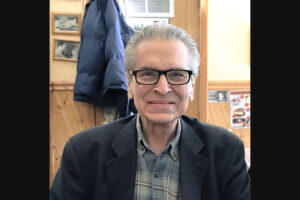When Rochelle L. Shoretz was diagnosed with breast cancer at age 28, she struggled to find the proper resources and support for women like her—Jewish women entering the “prime” of their life—until she founded Sharsheret in 2001. Sharsheret, a national nonprofit based in New Jersey, offers resources, support, and education for people of all Jewish backgrounds affected by breast and ovarian cancer.
“When [Shoretz] was looking [for] support and knowledge of what was going on […] she wasn’t finding a lot of resources for a combination of breast cancer and being a Jewish woman,” begins Eve Kleinerman, the Illinois chapter’s regional director. “[Additionally], she was a young, Jewish woman, [so] many of the resources for people with breast cancer as a whole were geared towards women who were quite a bit older than she was.”
Sharsheret (pronounced shar-sheh-ret) is Hebrew for “chain,” and, according to the organization, symbolizes the connections between women, families, and communities facing breast and ovarian cancer. “The concept was that each woman that we can connect to another is a link in our chain,” says Kleinerman. One of Sharsheret’s main missions is connecting women with one another to support each other through the cancer treatment process, because for people of Ashkenazi-Jewish descent, the risk is statistically alarming.
According to Kleinerman, 1 in 500 individuals carry the BRCA gene mutation—meaning they have a genetic predisposition toward developing breast and/or ovarian cancer, among others—but in the Ashkenazi-Jewish population, that number increases to 1 in 40. Peggy Cottrell, Sharsheret’s genetic counselor, explains that this is because of three common gene mutations in this population, called founder mutations, that occurred randomly and were passed down through generations. “Because of certain population factors in Eastern Europe, the frequency of these three mutations increased,” she says. “Part of this is because the Ashkenazi-Jewish population was relatively ‘closed,’ [meaning] that people didn’t migrate a lot, and tended to marry only other Ashkenazi Jews.”
Ashkenazi Jews have up to an 80 percent risk of getting breast cancer in their lifetime, and up to a 45 percent risk of getting ovarian cancer in their lifetime, if they carry a BRCA1 or BRCA2 mutation, according to Cottrell. “When the statistics are so high in the Ashkenazic-Jewish population, [that’s] where the need comes from,” Kleinerman says.
That’s why Sharsheret also offers genetic counseling—individuals are able to talk with Sharsheret and speak with medical professionals about the genetic implications of having Ashkenazi-Jewish heritage. “One thing that can be generalized to other religions but is also prevalent when Jewish women are diagnosed [is] what does that do to your faith?” Kleinerman asks. “What does that do for your belief in God? […] Does it make you question [if there is] even a God after all, if this is happening to me?”
1 in 500 individuals carry the BRCA gene mutation—meaning they have a genetic predisposition toward developing breast and/or ovarian cancer, among others—but in the Ashkenazi-Jewish population, that number increases to 1 in 40.
Culturally, however, there are practices that are entirely specific to people of the Jewish faith. “There are a lot of things that come up in the Jewish community when receiving breast and ovarian cancer diagnoses that don’t come up in the general population,” says Becky Koren, the Illinois chapter’s program coordinator. Some people will lose their hair during chemotherapy treatments, and opt to wear a wig. When women in the Orthodox-Jewish community get married, it is common practice to start wearing a wig. A woman wearing a wig during cancer treatment may now be confronted with unnecessary and sometimes hurtful congratulations.
“This woman thought that she was going to go wig shopping with her mother and mother-in-law [for her wedding],” Koren begins. “And it was going to be an exciting and beautiful time in her life, [but] here she is confronting this cancer diagnosis, and she has to wear a wig for that sad, scary reason instead of this meaningful right of passage.”
Other cultural implications include things like tattoos. During radiation treatment, doctors will use tattoos as markers to pinpoint the path for radiation, but in the Orthodox-Jewish community, tattoos are an unwelcome body modification. According to Koren, many Jewish women believe they won’t be able to be buried in a Jewish cemetery if they have a tattoo. “A lot of people have carried on this message from generation to generation, and have it in the back of their mind,” she says.
That’s why outreach education is such a big part of Sharsheret. Licensed clinical social workers on staff with insight into the religious, cultural, and genetic implications for this population make themselves available for those looking for information and support. “The goal of Sharsheret is having appropriate messaging,” says Kleinerman. “We can actually educate the community on things they need to be concerned about so they can take proactive steps for their health.”
Cancer is not typically an easy discussion for people of the Jewish faith. “Of course mammograms are so important and disclosing your health concerns to your OB-GYN every year is important, but those things are not always [something] people in the Jewish community are aware of or comfortable talking about,” says Kleinerman. “We’re really emphasizing creating a comfortable environment for men and women in the community [to realize] how important it is to take control of their own health [and] actually save lives by empowering the women and men who hear our programming to really take those steps.”
At its core, Sharsheret was founded to provide more resources for younger women who are diagnosed. “If you’re 65, 70 diagnosed with cancer, your immediate kind of every day implications are going to be different—you don’t have little kids at home, you’re not thinking about fertility or fertility preservation,” says Kleinerman. Sharsheret provides online information about fertility preservation and onco-fertility—“[Which] isn’t really a concern when you’re working with older women,” she says. They also provide a “Busy Box” to families with young children—a collection of developmentally appropriate toys plus resources that educate parents on how to speak with their children about cancer.
We’re really emphasizing creating a comfortable environment for men and women in the community [to realize] how important it is to take control of their own health [and] actually save lives by empowering the women and men who hear our programming to really take those steps.
Eve Kleinerman, Illinois regional director of Sharsheret
Providing education and resources for both older and younger women diagnosed with breast and ovarian cancer makes Sharsheret the number-one resource for individuals from all Jewish backgrounds. “It’s really nice, no matter who calls, no matter what their profession, […] we have an individualized way to help them and connect them with resources,” says Koren. The greater Sharsheret’s reach, the more people will know what’s available to them. “My vision is that everybody who ever needs to avail themselves of our services—I hope they would never have to—but they do understand that we are here for them [and] we can support them,” says Kleinerman.







